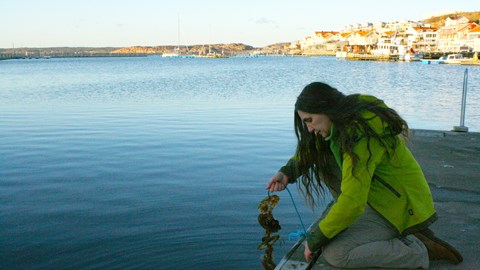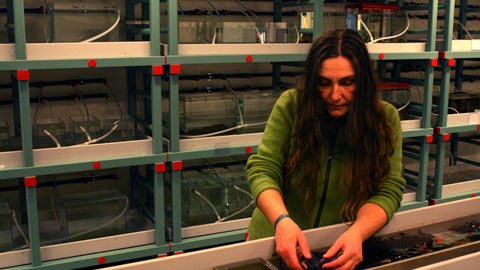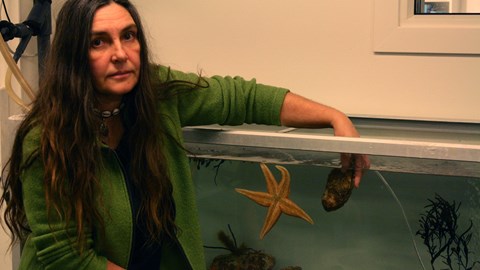The teacher who wants to inspire students with polar research
 Cristina Bernárdez sampling plankton at the school's pier. Gullmarsgymnasiet is located by the sea, enabling students to conduct sampling there. Photo: Niklas Larsson.
Cristina Bernárdez sampling plankton at the school's pier. Gullmarsgymnasiet is located by the sea, enabling students to conduct sampling there. Photo: Niklas Larsson.
Cristina Bernárdez, teacher at Gullmarsgymnasiet in Lysekil, sees the Canada-Sweden Arctic Ocean 2025 expedition as an opportunity to give students unique insights into the Arctic's sensitive ecosystem. She was selected for a teaching position aboard the icebreaker Oden, following a call from the Swedish Polar Research Secretariat in early 2025.
Hi Cristina! Please tell us a little about yourself.
– I am a biologist originally from Spain with a research background in marine biology. I moved to Sweden nearly 20 years ago, and for the past 10 years, I have been teaching at an upper secondary school. Currently, I work at Gullmarsgymnasiet in Lysekil, where I teach an advanced course in marine biology. I have a partner and two children, and I love nature and crafts of all kinds.
What is the best thing about your profession as a teacher?
– My students! Working with young, motivated, and curious individuals is a privilege. Being part of their learning, development, and transition into adulthood is very exciting. Additionally, I have fantastic colleagues, and as a teacher, you constantly learn new things every day!
What made you apply for the teaching position on the Canada-Sweden Arctic Ocean 2025 expedition?
– An expedition to the Arctic is a dream journey! When a friend told me about the announcement, I became curious and immediately began imagining how a teacher could benefit from such an experience. I was instantly sold.
What are you most looking forward to about the expedition?
– So much! Primarily, I want to learn about the Arctic ecosystem, understand the relationships between species and the physical environment, and explore how these are investigated. I am curious about all the projects planned for the expedition and hope to gain new knowledge—from sampling methods to data analysis. I'm also excited about experiencing the landscape, silence, light, and ice...everything!
What do you hope to get out of the expedition?
– Primarily, I hope to inspire my students and colleagues and provide them with a deeper understanding of polar research. I also hope my students will undertake smaller research projects—perhaps as high school projects—using data collected during the expedition. Additionally, I aim to share knowledge about polar research beyond my school, through social media, exhibitions, or other accessible formats.
Which of the seven work packages interests you the most, and why?
– I believe primary production (the process where marine phytoplankton uses sunlight to convert carbon dioxide into organic material, driving the ecosystem and affecting the Arctic Ocean’s carbon cycle) and acoustics will be particularly interesting and perhaps easier to integrate into my teaching. However, I’m curious about all the packages. Working closely with researchers from diverse fields of expertise is fantastic, and I intend to learn as much as possible from all seven work packages.
How do you plan to share the expedition experiences with your students?
– I will collect questions from my students before the trip. During the expedition, I’ll gather data that students can analyze to answer their questions. I also plan to keep an online diary so students can follow our activities in real time. Afterward, I hope to develop educational materials useful for other teachers or schools.
How are you preparing yourself mentally and physically for the expedition?
– I’ve started reading about the Arctic, previous expeditions, and watching documentaries about the North Pole to gather as much knowledge as possible beforehand. Physically, I haven’t changed my routine much – I continue walking, practicing yoga, and staying healthy.
What do you think will be the most challenging?
– Although it’s an extreme environment, I’m not particularly concerned about physical or psychological challenges. The most challenging part will likely be spending 40 days away from my family without consistent communication.
What do you absolutely not want to miss packing?
– A good book and knitting needles – in case there’s time for a break amid the fascinating environment and workload!
Anything you want to add?
– I believe it’s a wonderful initiative to include a teacher and an artist on a polar expedition. I hope my participation helps spread awareness about the polar environment.
The Canada-Sweden Arctic Ocean 2025 expedition runs from August 9 to September 19. You can read more about it here.




